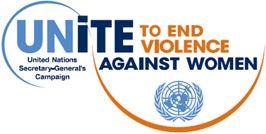
 Noting that almost half of all women in Latin America have been victimized or threatened with violence, United Nations officials joined Guatemalan President Alvaro Colom in Guatemala City for the Latin American launch of the U.N. campaign "Unite to End Violence against Women."
Noting that almost half of all women in Latin America have been victimized or threatened with violence, United Nations officials joined Guatemalan President Alvaro Colom in Guatemala City for the Latin American launch of the U.N. campaign "Unite to End Violence against Women."
Guatemalan President Alvaro Colom supports call for governments and citizens of Latin America to unite and say "no" to gender-based violence
 Guatemala City, 25 November 2009—Noting that almost half of all women in Latin America have been victimized or threatened with violence, United Nations officials are set to join Guatemalan President Alvaro Colom today in Guatemala City for the Latin American launch of the U.N. campaign "Unite to End Violence against Women."
Guatemala City, 25 November 2009—Noting that almost half of all women in Latin America have been victimized or threatened with violence, United Nations officials are set to join Guatemalan President Alvaro Colom today in Guatemala City for the Latin American launch of the U.N. campaign "Unite to End Violence against Women."
The campaign, originally launched by U.N. Secretary-General Ban Ki-Moon, seeks to raise awareness in Latin America and worldwide of the heavy toll that gender-based violence takes on women and girls, their families, and societies as a whole.
According to U.N. data, one in three women globally has been or will at some point in her life be a victim of violence. As a human rights violation, violence against women is unacceptable, inexcusable, and intolerable. But it is also a serious public health problem: it is a major cause of injury as well as a risk factor for a host of physical and mental health problems that affect women, their families, and their communities.
With the slogan "Say No — Unite to End Violence against Women," the multi-year U.N. campaign calls on governments, civil society, the private sector, the media, the general public, and members of the U.N. system to work together through the year 2015 to eliminate all forms of violence against women and girls. The campaign sees ending violence against women as the responsibility of everyone and seeks to bring men and women together to raise the necessary awareness and political will to construct an egalitarian and nonviolent society.
Studies by the U.N. Economic Commission for Latin America and the Caribbean (CEPAL) have found that 45 percent of women in the Region say they have been threatened by their partners, while other surveys find that the proportion of women who have suffered physical violence at the hands of a partner ranges from 16 percent in the Dominican Republic to 42 percent in Peru. From 5 percent to 11 percent of women say they have been victims of sexual violence, and the proportion who say they have been victims of emotional violence ranges from 26 percent in the Dominican Republic to more than 60 percent in Colombia and Peru.
Femicide, or the selective killing of women, and other forms of physical and psychological violence against women are a serious problem in Guatemala as well as other countries of the Americas. Between January and October of 2009, 602 murders of women were reported in Guatemala, and 98 percent of these cases remain unsolved. Nevertheless, Guatemala has advanced in the development of a better legal framework, policies, strategies, and programs to reduce violence against women, including a landmark 2008 Law against Femicide and Other Forms of Violence against Women.
Today's launch of the new U.N. campaign will feature remarks by Guatemala's president and other dignitaries, as well as a "Knowledge Fair" to share work experiences and evidence on violence against women in the Americas, and a free concert by Latin Grammy-winning singer Fonseca, to be held at Guatemala City's Constitution Plaza. The launching events also coincide with this year's observance of the International Day for the Elimination of Violence against Women and the start of 16 Days of Activism that will culminate on Dec. 10, Human Rights Day.
Today's activities are being webcast at http://www.ustream.tv/channel/gt-undp. Campaign supporters in five other Latin America capital cities—Caracas, Bogotá, La Paz, Lima, and Quito—have pledged to plant "End Violence against Women" trees to symbolize the living, growing commitment to eradicating gender-based violence.
PAHO works with all the countries of the Americas to improve the health and quality of life of the people of the Americas. As the Regional Office for the Americas of the World Health Organization (WHO), PAHO is a member of the United Nations system.
Links of interest
For more information please contact: Donna Eberwine-Villagrán, Tel. 202 974 3122.



